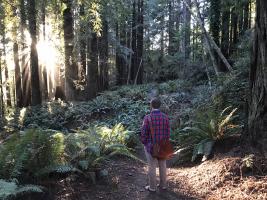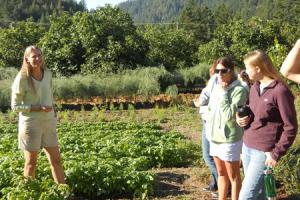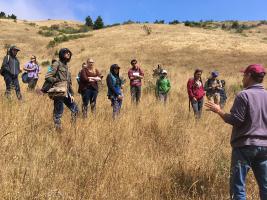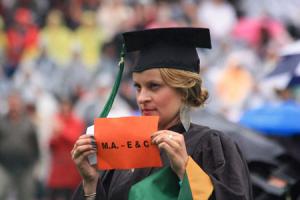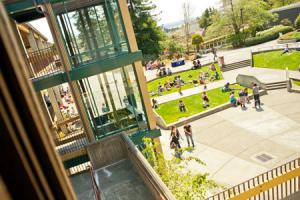Spring2010
February 11
Kim Berry, “Disowning Dependence: Single Women’s Collective Struggle for Land Rights in Northwestern India”
CLICK HERE TO SEE VIDEO OF LECTURE
Kim Berry received her PhD in Anthropology from Cornell University in 1997. She currently serves as Professor and Program Leader of Women’s Studies and Co-director of Multicultural Queer Studies at Cal Poly Humboldt. Her research and teaching interests are in postcolonial and intersectional feminisms; postcolonial queer theory; theories of space, place and identity; the gendered and racialized effects of neoliberal globalization; and the ethics of transnational feminist research. She has been conducting research on rural women’s movements in northwestern India since 1992. Her current research focuses on single women’s collective demands for land rights and an independent identity.
watch full presentation
5:30pm, Founders Hall 118
February 18
Garvin Heath, “Environmental Impacts of Energy Technologies: A Life Cycle Perspective”
Garvin Heath is a senior scientist in the Strategic Energy Analysis Center of the National Renewable Energy Laboratory (NREL). At NREL he specializes in analyzing the environmental impacts of energy systems using the tools of life cycle assessment, air quality modeling and sustainability analysis. He received his PhD in Energy and Resources from the Energy and Resources Group of the University of California, Berkeley in 2006. He also holds an MS degree in Environmental Engineering from UC Berkeley. His previous professional experience includes five years with the Indoor Environments Division of the US EPA, in addition to various assignments with researchers at Lawrence Berkeley National Laboratory and Environmental Defense. He currently resides in Boulder, CO where he also holds an adjunct research position at the University of Colorado at Boulder.
6:30pm, Natural Resources 101
March 4
Cynthia Chandler, “Democracy Across Prison Walls”
Cynthia Chandler is a prison industrial complex abolitionist, writer, speaker, and social justice entrepreneur. Cynthia has worked on issues of women’s health and prison abolition for over 15 years. She is the co-founder and Executive Director of Justice Now, a human rights organization dedicated to partnering with people in women’s prisons and local communities to build a safe, compassionate world without prisons. Justice Now is the first legal clinic program focused on abolition and women in prison, the first program internationally to train people in prison on international human rights, and leads the show in partnering with people in prison to generate human rights reports. Justice Now is at the forefront of a national movement to identify the ways that people of color, people from marginalized cultural and ethnic groups, queer people, and transpeople have been disproportionately impacted by the U.S. prison system. By focusing on the experience of people housed in women’s prisons, Cynthia Chandler will provide critical insight and perspective on several volatile issues in the United States – the right to gender expression and interrogating stratified gender roles, women’s health and the impact of HIV, and gendered and racialized violence. Cynthia will also give a history of Justice Now’s unique democratic organization strategies involving both people serving time and people on the outside.
5:30pm, Native Forum (Behavioral and Social Sciences 162)
April 8
Timothy Lipman, “Low Carbon Vehicle Research at UC Berkeley’s Transportation Sustainability Research Center”
Watch full presentation
Timothy Lipman, PhD, is an energy and environmental technology, economics, and policy researcher and lecturer with the University of California, Berkeley. He is serving as Co-Director for the campus’s Transportation Sustainability Research Center (TSRC), based at the Institute of Transportation Studies, and also as Director of the U.S. DOE Pacific Region Clean Energy Application Center (PCEAC). Tim’s research focuses on electric-drive vehicles, fuel cell technology, combined heat and power systems, renewable energy, and hydrogen infrastructure. He completed a Ph.D. degree in Environmental Policy Analysis with the Graduate Group in Ecology at UC Davis (1999), an M.S. degree in the technology track of the Graduate Group in Transportation Technology and Policy also at UC Davis (1998), and a B.A. from Stanford University (1990). A native of Golden, Colorado, he now lives in the Oakland hills with his wife Susan and son Rowan and enjoys outdoor recreation and travel in his spare time.
6:30pm, Natural Resources 101
April 15
Omar Masera, “Efficient Cookstoves – Mitigating Climate Change while Advacing Sustainable Development Priorities: The Case of Efficient Cookstoves”
Watch full presentation
Omar Raúl Masera is Director of the Bioenergy Laboratory at the Center for Ecosystems Research, National University of Mexico (UNAM) and President of the Mexican Network on Bioenergy. He is a member of the Mexican Academy of Sciences and the Intergovernmental Panel on Climate Change. Dr. Masera’s research interests focus on the interactions between energy, forests, technology and climate change. Currently Dr. Masera leads the “Patsari Cookstove Project” in Mexico, an interdisciplinary and international collaborative approach directed to the development and dissemination of sustainable alternatives for rural cooking in Mexico, which has obtained international recognition.
5:30pm, Behavioral and Social Sciences 166
April 29
Jane Nielsen and Howard Wilshire, “The American West at Risk: Science, Myths, and Politics of Land Abuse and Recovery”
Jane Nielson worked as a field and research geologist for the U.S. Geological Survey for over 20 years, specializing in Mojave Desert geology and studies on the generation and transport of fluids in the deep Earth. Before her USGScareer, Dr. Nielson taught Environmental Geology at California State University, Hayward, and after at Pomona College, Claremont, California. She is a co-founder of the Sebastopol Water Information Group, serves on the board of directors for the O.W.L. (Open-Space, Water, and Land Conservation) Foundation, and helps direct the Sonoma County Water Coalition.
Howard Wilshire worked for the U.S. Geological Survey as a research geologist after 5 years of teaching geology at Sydney University and research at the Australian National University. His 35-year USGS career included geologic mapping, Apollo astronaut training and lunar research, and broad-ranging studies on geologic processes at the land surface. Dr. Wilshire is Board Chairman of Public Employees for Environmental Responsibility (PEER), a national environmental organization.
5:30pm, Behavioral and Social Sciences 166

